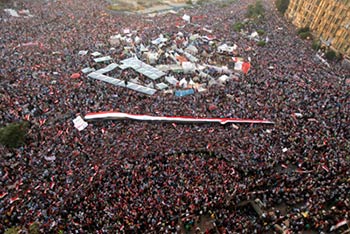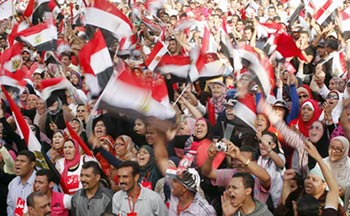

Vol. 77/No. 27 July 15, 2013
(lead article)
Massive anti-government
actions erupt across Egypt
Rulers from Tunisia to Turkey watch warily
 |
| Reuters/Mohamed Abd El Ghany |
 |
| Reuters/Asmaa Waguih |
| June 30 protests demand Egyptian President Mohammed Morsi resign. Top, Cairo’s Tahrir Square;bottom, Alexandria. |
The Muslim Brotherhood called counterprotests to back the president, some in the hundreds of thousands, and clashes between the two sides are reportedly escalating.
Meanwhile, the military high command is presenting itself as “defender of the people,” standing above the deepening conflicts between the workers, farmers and their allies on the one hand and the propertied rulers — themselves divided between the military and Muslim Brotherhood — on the other.
Hundreds of thousands gathered at Cairo’s Tahrir Square June 30. Egypt’s daily al-Ahram reports on its English-language website millions participated in protests across the country July 2.
In Cairo, Morsi’s opponents trashed and burned the Muslim Brotherhood headquarters, while the police and army did nothing. Police later arrested 15 Muslim Brotherhood armed guards after an exchange of fire.
The June 30 protest was called by Tamarod (Rebel), a new youth group, which says it has collected 22 million signatures on a petition calling for Morsi’s removal and presidential elections.
“We reject you because the deprived still have no place,” the petition says, “because no justice has been brought to the martyrs … because the economy has collapsed and depends only on begging … because Egypt is still following the footsteps of the USA.”
Fear over reverberations of the popular mobilizations are gripping the capitalist rulers of the region and beyond. In Tunisia, the cradle of the “Arab Spring,” young people have formed a Tamarod group that seeks to organize a similar movement. In Turkey, thousands are simultaneously in the streets backing Kurdish rights. Officials of the government in Israel voice concern of “instability in a big and influential neighboring country.” And oil prices are rising amid trepidations over the reliability of trade routes through the Suez Canal.
On July 1 the military high command gave Morsi and the opposition 48 hours “to come to a consensus and get out of the crisis.” If they don’t, the army will announce its own “road map for the future and the steps for overseeing its implementation.”
Tamarod leaders welcomed the deadline and said in a statement that “the army’s historic role is to take the side of the people.”
Under pressure, Foreign Minister Mohammed Kamel Amr, several cabinet members and administration spokesmen resigned July 1-2. On the night of July 2 Morsi said he was willing to “pay with my life to protect the legitimacy” of his election and the Muslim Brotherhood-drafted constitution.
The Supreme Council of the Armed Forces removed Mubarak from power in February 2011 after weeks of popular protest. Morsi was elected president in June 2012.
Under Mubarak the army and police persecuted and arrested Muslim Brotherhood supporters. After winning the elections, the new Brotherhood government began organizing to push the working class, the burgeoning union movement and the masses back on the sidelines. At the same time, it tried to curb the power of the military, which has remained, with a lower profile, the main pillar of bourgeois rule.
After taking office, relations between the Brotherhood and the high command was a tug-of-war of compromises and conflicts. Morsi forced the retirement of Field Marshal Mohamed Tantawi as head of the Supreme Council, but also pushed through a new constitution that protected the military’s power.
Workers press demands for unions Workers press demands for unions
Working people took advantage of the space opened with the removal of Mubarak — and the power struggle among competing factions of the capitalist class that ensued — to press their demands for the right to organize unions and for higher wages and better working conditions. They ignored repeated calls first by the military junta and then by Morsi to halt the work stoppages.According to the Cairo-based International Development Centre, protest actions now average 1,140 a month, compared to 176 a month during the last year of Mubarak’s reign and 500 a month at the beginning of this year. There have been thousands of strikes, sit-ins, marches and other workers’ actions over the last two years.
Capitalist corporations have responded to the waves of labor actions by boycotting investment in production, which is at its lowest level since records began in 1980, according to the International Monetary Fund.
The investment boycott has exacerbated the effects of the world capitalist economic crisis. Independent trade union leaders say that 4,000 factories have shut down since Mubarak’s fall. Official unemployment is 12.5 percent.
Some 40 percent of Egypt’s population gets by on $2 a day or less. Food prices have been skyrocketing — flour and sugar have jumped 50 percent in the last year — and many working people depend on government subsidized bread sold at less than one cent, as well as subsidized rice, oil and sugar to survive.
“The Morsi government has not solved any problems since it came to power,” Fatma Ramadan, a spokesperson for the Egyptian Federation of Independent Trade Unions, told the Militant by phone July 1. She cited the example of the Portland Cement Company in Alexandria, where a sit-in by striking temporary workers demanding permanent work was broken up Feb. 17 by police, who arrested more than 100.
The opposition to Morsi is heterogeneous and includes everything from trade unions and groups that call themselves socialist to the main capitalist opposition political parties and supporters of deposed dictator Mubarak.
“We are with the demands to remove Morsi by the military forces,” said Mohamad Ahmad Salem, a spokesperson for the Egyptian Democratic Labor Confederation, in a phone interview from Mahalla El Kubra. “We cannot live under the rule of the Muslim Brotherhood. This system destroyed the country and the workers.”
The Committee of the Students of June 30, which includes representatives from the Socialist Popular Alliance, the Student Union of American University and the Revolutionary Movement of the British University in Cairo, said they are for a “national unity government” to replace Morsi until new elections are held.
If the military takes power again, “it will be a black day for Egyptian workers,” Ramadan said. “But what makes me patient is that the people will go out to the streets again and again.”
Bashar Abu-Saifan in Beirut, Lebanon, contributed to this article.
Related article:
Thousands march in Turkey in support of Kurdish rights
Front page (for this issue) |
Home |
Text-version home